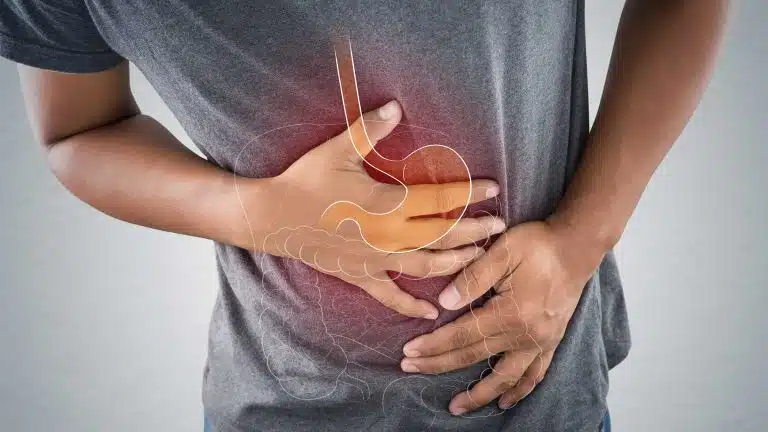The Link Between Irritable Bowel Syndrome (IBS) & Alcohol

According to the National Institute of Diabetes and Digestive and Kidney Diseases (NIDDK), irritable bowel syndrome (IBS) is a group of gastrointestinal symptoms that occur together to form a disorder.
Alcohol is considered an irritant for those with IBS. Heavy alcohol intake can exacerbate IBS symptoms and lead to other problems in your digestive system.
Symptoms Of IBS
Those with IBS may experience recurring symptoms such as:
- diarrhea
- abdominal pain
- constipation
- frequent changes in bowel movements
- bloating
IBS affects the large intestine and is sometimes referred to as spastic colon, IBS colitis, nervous colon, spastic bowel, or mucous colitis.
In addition to the core recurring stomach pain and symptoms of IBS, those with the problem may also experience:
- excessive gas
- cramping
- nausea
- indigestion
How Alcohol Affects IBS
Those who drink alcohol can irritate or damage tissues and organs in their digestive tract if they don’t manage their alcohol consumption. Drinking an excessive amount of alcohol or binge drinking can cause a number of gastrointestinal problems.
Digestive Issues
Alcohol weakens the immune system and lowers the number of nutrients in the small intestine. If the lining of the small intestine is damaged, celiac disease may occur.
Those who have IBS and celiac disease, which are both similar and have overlapping symptoms, will likely need to avoid drinking alcohol. Gluten, which can be found in some alcohol, is one of the IBS triggers that can cause digestive issues.
Acid Reflux
Too many alcoholic drinks can also damage the esophageal sphincter. When this takes place, acid reflux can occur. This can lead to excess acid in your stomach, which can cause more damage to your digestive tract.
Risk Factors For IBS
NIDDK states that women are up to two times more likely to develop IBS than men. The prevalence of IBS more likely occurs in those under 50 as well.
In addition to this, there are other risk factors for IBS, including
- alcohol use disorder (AUD)
- prior infections in your digestive tract
- having a family member with IBS
Those who have dealt with traumas in their life may also be more likely to experience IBS. Trauma impacts our mental health negatively and alcohol can do the same.
Treating IBS
To help manage IBS, your doctor may give you dietary guidelines to follow. It can be helpful for IBS patients to keep a log of the foods they eat each day. This way, they can determine which foods are irritants and remove them from their diet.
Avoiding FODMAP Foods
FODMAP is an acronym for fermentable oligosaccharides, disaccharides, monosaccharides, and polyols. Certain FODMAP foods should be avoided to help ease your IBS symptoms.
Avoiding high FODMAP foods such as garlic, ice cream, mushrooms, and onions can limit the type of triggering carbohydrates that enter the digestive tract. A low FODMAP diet will likely help prevent flare-ups.
Avoiding Alcohol Consumption
Even some light drinking can lead to an IBS flare-up, so those diagnosed with IBS should avoid alcoholic beverages and mixers which can have high fructose corn syrup.
If you or a loved one are struggling with alcohol abuse, contact our helpline to learn about our addiction treatment services.
Written by Ark Behavioral Health Editorial Team
©2024 Ark National Holdings, LLC. | All Rights Reserved.
This page does not provide medical advice.
Alcohol Research - Alcohol and Gut-Derived Inflammation
National Institute of Diabetes and Digestive and Kidneys Diseases - Definition & Facts of IBS
National Institutes of Health - Alcohol Use Disorder Increases the Risk of Irritable Bowel Disease
National Institutes of Health - Pattern of Alcohol Consumption and its Effect on Gastrointestinal Symptoms in Inflammatory Bowel Disease
National Institutes of Health - Relationship between Patterns of Alcohol Consumption and Gastrointestinal Symptoms among Patients with Irritable Bowel Syndrome
National Library of Medicine: MedlinePlus - IBS

Questions About Treatment?
Ark Behavioral Health offers 100% confidential substance abuse assessment and treatment placement tailored to your individual needs. Achieve long-term recovery.
100% confidential. We respect your privacy.
Prefer Texting?
Our friendly support team is here to chat 24/7. Opt out any time.







 Learn More
Learn More








